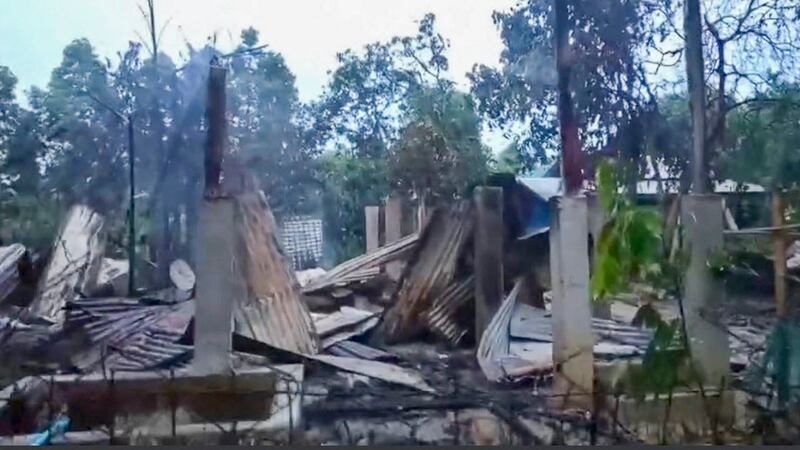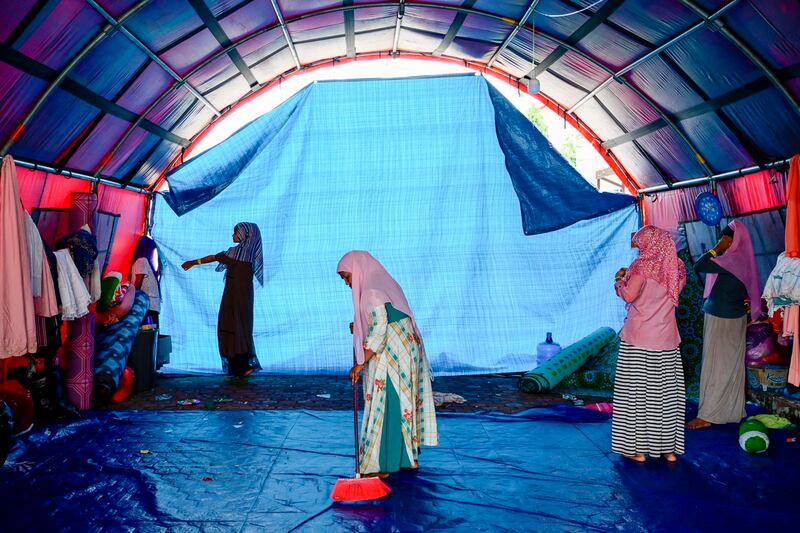At least 40,000 ethnic Rohingyas have been forced to flee intense clashes between junta troops and the rebel Arakan Army in two townships in western Myanmar’s Rakhine state since the start of the week, and are now facing a humanitarian crisis, the displaced told RFA Burmese on Thursday.
The fighting in Maungdaw and Buthidaung townships came amid widespread gains in Rakhine state by the Arakan Army, or AA, that prompted the junta to implement a draft to shore up depleted troop losses.
As part of its efforts, the military has reportedly forcibly recruited Rohingyas into pro-junta militias which it says must be formed to protect their Muslim faith in majority Buddhist Rakhine state.
But observers say the junta is trying to stoke ethnic tensions in the region to slow the Arakan Army’s advance.
Nay San Lwin, a Rohingya rights activist who is monitoring the situation, said that the 40,000 first began to flee on Monday and hail from more than 10 villages, including Buthidaung’s Ka Kyet Bet, Ah Lel Chaung and Ba Gon Nar villages, and Maungdaw’s Paung Zar and Hla Baw Zar villages – all of which are located in close proximity to the fighting.
“Rohingyas are not allowed to take shelter at IDP [internally displaced people] camps, so they will not receive humanitarian aid,” he said. “Between 40,000 and 50,000 Rohingyas – including women, children, the elderly and the disabled – have been forced to flee from the villages in Buthidaung and Maungdaw.”
Nay San Lwin said that the number of displaced was confirmed after speaking to Rohingyas from the villages by phone over the last three days.
Rohingya sources say the situation in Rakhine state has grown increasingly complex in recent weeks and that members of their ethnic community are being exploited and oppressed by both the military and the AA.
Rohingya activists estimate the Rohingya population of Buthidaung to be around 200,000 and of Maungdaw to be some 80,000, totaling nearly 300,000 people. Those who have fled since Monday account for nearly 15% of the Rohingya population in the two townships.
Warned to flee by AA
A Rohingya resident of Maungdaw township who, like others interviewed for this report, spoke on condition of anonymity due to security concerns, told RFA that his escape was prompted by warnings of impending clashes from the AA.
"The AA told us that there would be a fight here, so we fled," he said, adding that the ethnic rebels advised seeking shelter in urban areas to avoid junta heavy artillery and airstrikes. “The AA didn’t attack us, they urged us to flee.”
Attempts to contact AA spokesperson Khaing Thukha about the situation in the two townships went unanswered Thursday.

Armed conflict escalated in Maungdaw in May, and the Rohingya resident said that while the junta has bombarded the township, the pro-junta No. 5 Border Guard Police Force, based in Maungdaw’s Myo Thu Gyi village, has “opened fire every day.”
A Rohingya from Buthidaung called the situation there “life-threatening.”
"We are not safe at all and have already been targeted in an airstrike,” he said. “I have fled with all of my family members from the conflict areas. People from six or seven villages have run away … Now we are facing difficulties getting food.”
He went on to say that Rohingyas from Maungdaw and Buthidaung had been unable to flee to urban areas and were forced to take shelter in nearby villages.
Ethnic Rakhines also at risk
Other residents told RFA that ethnic Rakhines have also been fleeing Maungdaw and Buthidaung townships.
On Tuesday, RFA reported that junta troops and their pro-junta Rohingya militias set fire to nearly 50 houses in Maungdaw's Shwe Yin Aye and Wai Thar Li villages from May 6-9.
RFA was unable to reach Attorney General Hla Thein, the junta’s spokesperson for Rakhine state, for comment on the situation in Maungdaw and Buthidaung on Thursday.
In a message posted to the social media platform Telegram on Wednesday, AA spokesperson Khaing Thukha accused the junta of forcibly recruiting Rohingya from camps for the displaced in neighboring Bangladesh, where nearly 1 million languish after fleeing ethnic violence in Rakhine state in recent years.
He also condemned insurgent groups the Arakan Rohingya Salvation Army, the Arakan Rohingya Army and the Rohingya Solidarity Organization for claiming that they had aligned with the AA to fight junta troops.

The same day, Rohingya refugees told RFA that the Arakan Rohingya Salvation Army and the Rohingya Solidarity Organization had forcibly recruited “at least 500 people” for military service from camps for displaced Rohingyas in Bangladesh’s Cox’s Bazar between April 29 and May 8.
The Arakan Rohingya Salvation Army, the Arakan Rohingya Army and the Rohingya Solidarity Organization have not made any announcement about recruitment at the camps.
Residents of Rakhine state say that more than 2,000 Rohingyas have been forcibly taken for conscription from the capital Sittwe, and the townships of Kyaukphyu, Buthidaung and Maungdaw since February, when the junta announced it was implementing the military service law.
More than 166,000 people have fled their homes amid the conflict in Rakhine state, according to the United Nations Office for the Coordination of Humanitarian Affairs. The fighting began in November, when the AA ended a ceasefire agreement that had been in place with the military since it seized power from Myanmar’s democratically elected government in a February 2021 coup d’etat.
Translated by Aung Naing. Edited by Joshua Lipes and Malcolm Foster.
